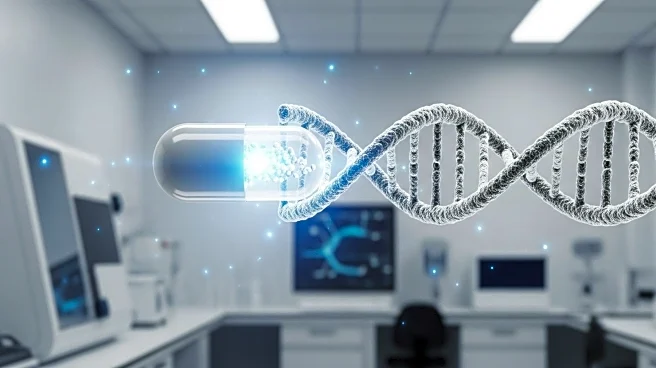What's Happening?
Novo Nordisk has announced the acquisition of Akero Therapeutics for up to $5.2 billion, causing Akero's stock to surge by 19%. The deal includes an upfront payment of $54 per share, representing a 16.2% premium over Akero's previous closing price. Akero is developing efruxifermin, an experimental drug aimed at treating fibrosis and cirrhosis associated with metabolic dysfunction-associated steatohepatitis (MASH). Novo Nordisk plans to integrate this drug into its existing portfolio, which includes treatments for diabetes and obesity. The acquisition is expected to close by the end of the year, with an additional payment contingent on U.S. approval of efruxifermin by 2031.
Why It's Important?
This acquisition is significant for Novo Nordisk as it seeks to expand its treatment options for metabolic diseases, a rapidly growing sector. The integration of efruxifermin could enhance Novo's position in the market, especially as it faces competition from other pharmaceutical companies like Eli Lilly. The deal also reflects Novo's strategic shift towards niche acquisitions to bolster its portfolio amidst challenges such as job cuts and market value fluctuations. For Akero, the acquisition provides financial backing and resources to advance its drug development, potentially leading to breakthroughs in treating liver diseases.
What's Next?
The acquisition is set to finalize around the year's end, pending regulatory approvals. Novo Nordisk will focus on obtaining full U.S. approval for efruxifermin, which could lead to further financial incentives. The company may also explore synergies between efruxifermin and its existing obesity drug, Wegovy, to enhance treatment efficacy. Stakeholders, including investors and healthcare providers, will be closely monitoring the approval process and potential market impacts. Novo's strategic focus on metabolic diseases may lead to further acquisitions or partnerships in the future.
Beyond the Headlines
The acquisition highlights the growing importance of addressing metabolic diseases, which have significant health implications globally. Novo Nordisk's investment in efruxifermin underscores the potential for innovative treatments to transform patient care. The deal also raises questions about the ethical considerations of pharmaceutical pricing and access to new therapies. As Novo navigates competitive pressures, its approach to cost management and workforce restructuring will be critical in maintaining its market position.










